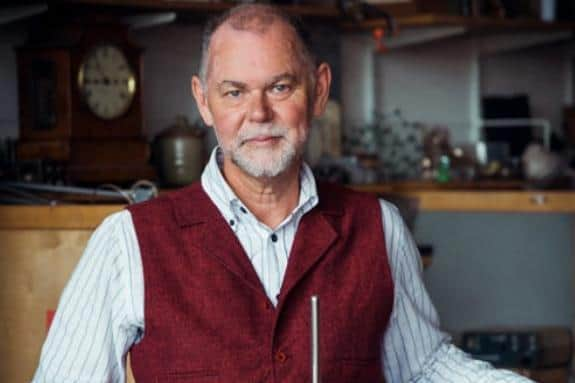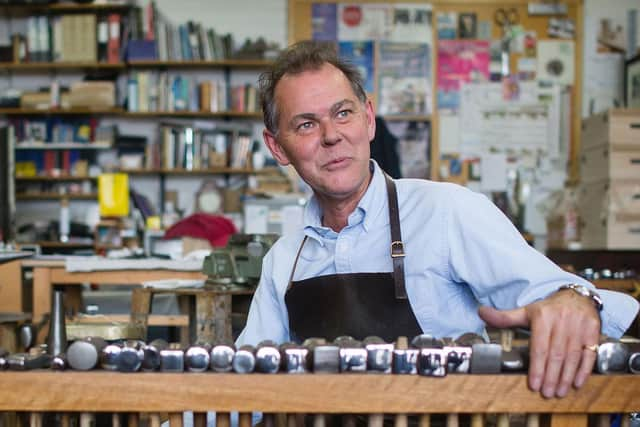Meet the Sheffield silversmith who has been giving his customers a taste of luxury for decades
After attending for a year, unsure of what he wanted to do, a member of staff suggested to Brett that he went to study silversmithing in Sheffield.
“I just thought it sounded good really,” says Brett, from his studio at Persistence Works, in Sheffield, “so I applied to the arts college, which at that time was on Psalter Lane, got a place, got on a train, and I’ve been here ever since.”
Advertisement
Hide AdAdvertisement
Hide AdNow, after over 30 years in the profession and specialising in contemporary handmade silverware for the modern home, Brett is pushing for the public to rethink their opinions on silverware, creating modern pieces for long-term, everyday use, which he hopes people will come to think of as worthy of investment.


“It’s kind of vaguely absurd really to be a silversmith in the 21st century,” he says, “because people think of it as being quite an old-fashioned thing, and some of it is to be truthful.
“Pieces of mine are in collections and museums every so often, but where I want them to go is into the cutlery drawer next to the sink in your kitchen.
“I like to make little olive picks, or soup spoons, or saucepans for boiling your soup or your cabbage in, things that you use every day,
Advertisement
Hide AdAdvertisement
Hide Ad“They do tend to be a little bit more expensive,” he adds, “but actually and truthfully not that much more expensive - and they last longer - and they’re recyclable.”


Sustainability is one of the many benefits Brett sees to using silverware.
Not only can the metal be recycled, he notes, but its durability means it can be passed down through generations.
“It also lasts forever and it never loses its value - so if you have some silver cutlery you can use it for an entire lifetime, then hand it on to somebody else to use for their lifetime.
Advertisement
Hide AdAdvertisement
Hide Ad“Or you can even just cash it in and get your money back, and then the material gets recycled and made into something else.”
In the past, Brett has produced high profile commissions for a number of clients, his last one being a centrepiece for the House of Lords on the Queen’s diamond jubilee.
He notes that while this type of recognition and challenge is still a huge draw for many people looking to start silversmithing, his hope is that others may also move away from its more traditional uses.
“Some people like to make big prestigious things and they want famous clients,” he adds, “but other people think of silver as this very modern material that you make modern items out of, and personally I hope the latter gains more and more traction.”
Advertisement
Hide AdAdvertisement
Hide AdBrett notes how younger silversmiths are now transforming how the industry looks in the wake of Sheffield’s large-scale factories shutting down.
“The big factories that used to exist in places like Sheffield have long gone,” he says, “and they’re not making masses of stuff like they used to.
“So the modern silversmith is younger, and they tend to have come through a design or art school training - and they’re making very small batches of individually designed, hand-crafted items.”
“It’s gone back to pre-industrial revolution times when there were small, highly skilled workshops producing things.”
Advertisement
Hide AdAdvertisement
Hide AdBrett hopes that if more of these young silversmiths are willing to make everyday items, the public’s perception of silverware can perhaps be shifted towards thinking of it as a normal household article worthy of investment.
“I hope that more silversmiths will be making practical objects,” he says, “and that more people will think ‘alright it’s a bit more expensive, but I can have this and I can enjoy it and it’s a brilliant material to use every day’.
“And their dining table doesn’t have to look like Downton Abbey, you can eat beans on toast on a kitchen bar, but you can use a silver knife and fork, or you can cook your baked beans in a little silver saucepan, and believe me they taste a lot better cooked in a silver saucepan.”
Brett also hopes that people could come to think of owning a small amount of silverware as a minor indulgence they can occasionally enjoy as a small slice of the finer things in life.
Advertisement
Hide AdAdvertisement
Hide Ad“Life’s tough,” he says, “and every now and again on a Sunday morning, when you’ve got a bit of time to yourself, and you think for example: ‘I’m going to have a bowl of Crunchy Nut corn flakes with ice cold milk, just for a moment I’m going to switch the world off and enjoy this’, you can add to that: ‘Actually, I’ve got a silver spoon I’ll eat them with.’”
For more information about Brett and his work and examples of his designs, visit his website: https://brettpayne.com.
Exhibition planned next month
In September, Brett is set to exhibit at Goldsmiths’ Fair in London.
This year marks the 40th anniversary of the fair, and the 33rd time the Brett has exhibited there.
Advertisement
Hide AdAdvertisement
Hide AdOne of the most exciting things, he notes, is seeing some of his work outside a workshop setting for the first time.
A spokesperson for the Fair said: “Bringing together 136 of the UK’s most extraordinary silversmiths and goldsmiths, this year’s Fair will not disappoint.
“From wire work to 3D printing, traditional goldsmithing to intricate engraving, the 40th anniversary exhibitors combine ancient techniques with modern day technologies.”